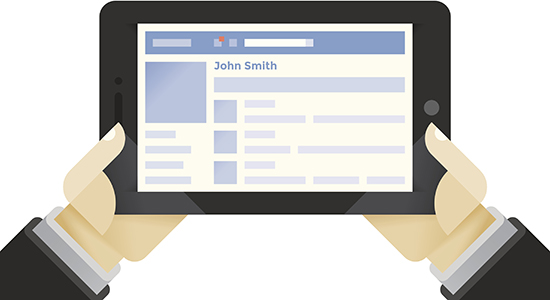
June 1, 2016 – Frequently our research takes us outside the “legal” world. Locating information on a particular individual is a common example.
First Step: Gather What You Know
When conducting a general online search for an individual, it is important to gather all known facts such as age, employment, and address. Remember also that the person may go by more than one name. Professionally they may use one name while using another in a more social setting. For example, William may also go by Bill, Billy, Will, Wm., etc. Do they use their middle initial? Do you know their middle initial? With this in mind, try variations in your search. Take advantage of phrase searching (putting the name in quotes) to limit the number of false hits.
TIP: To increase accuracy, try a variety of resources and compare information.
Ask yourself these questions: Is the website an authoritative source (such as a government website)? Does the website indicate where it obtains its information? Can you identify when the website was last updated? Is the same information repeating itself?
For example, five websites list an individual living in Ashland and one lists them as living in Appleton. Verify and cross-reference information as it is obtained. Try searching yourself to get an idea of the currency and correctness of the data.
Resources: Paid Options
There are several quality subscription-based resources that can assist in this process and – depending upon your needs, contract, and budget – these options may be the most effective approach. A sampling of paid options include Lexis, Westlaw, TLO, Accurint, Avention, and Bloomberg.
 Bev Butula is Director of Library of Services at Davis & Kuelthau, Milwaukee. She is a past president of the Law Librarians Association of Wisconsin (LLAW) and was formerly a litigation paralegal. LLAW's Public Relations Committee coordinates regular contributions by its members to InsideTrack.
Bev Butula is Director of Library of Services at Davis & Kuelthau, Milwaukee. She is a past president of the Law Librarians Association of Wisconsin (LLAW) and was formerly a litigation paralegal. LLAW's Public Relations Committee coordinates regular contributions by its members to InsideTrack.
A researcher may choose, however, to begin an investigation by selecting one of numerous free online resources available on the web. Keep in mind that using these resources, although of little or no monetary expense, can be a time-consuming process.
Free Online Resources
There are numerous free online resources for gathering information on individuals.
The following is a small sampling, based on specific examples, to assist with this type of investigative research.
Where to look depends upon why the research is being conducted (e.g., expert, opposing counsel, key company executives, asset search, process service, criminal activity) and what is already known about the individual (e.g., owns property).
Online Telephone Directories & Social Media Sites
Searchers may initially begin their research in AnyWho, 411.com, ZabaSearch, or just put the name in a general search engine such as Google or Bing. However, the information provided may be limited, and some websites may require payment for a “complete picture.” Conducting a search in LinkedIn, Facebook, Spokeo, or Pipl may offer additional information, such as employment.
As with all research, a strategy is needed for successful results. Identify which factors about the individual you want to locate or verify, and list out possible resources to assist.
Asset Searching
Searches are often conducted to verify a person’s assets. Searching city or county records may be a logical first step to determine if they own the property. Public Records.com and Black Book Online are just two portals that provide direct links to real property data for various Wisconsin counties. However, one of my past favorites for land records, Portico, had a significant number of dead links when recently checked. Still, the website offers links to several other public record resources.
The Wisconsin Register of Deeds Association provides the listing, Counties Offering Access to Real Estate Records; however, again, several of the links were not working at the time of this writing. Check out their interactive map for alternate access.
Remember that some municipal land record databases provide the ability to search by name while others limit the search to address or tax key. The Real Estate Transfer Return database may be an appropriate avenue for details on real estate sales. Also explore websites such as REHOLD that attempt to aggregate real estate information.
Business Development Resources
Business development may be another reason for researching an individual. In addition to searching for general background using some of the previously mentioned resources, it may be beneficial to identify business relationships. CorporationWiki and Muckety may provide insight depending on the size of the organization.
With just these two examples, it is clear there are a significant number of free resources to assist when conducting investigative research on people. Beyond “Googling” a person, the options vary depending on the type of information one is hoping to find. Regardless of the sources used, the key is to verify, build upon facts, and accept that it is a process.
Additional Public Record Resources
Below are a few additional beneficial resources when attempting to gather information on an individual.
-
Internet for Lawyers – Carole Levitt and Mark Rosch include several quality articles and blog posts on their website as well as having authored several great books.
-
BRBPub.com – This portal is arranged by state for direct access. Find links to topically organized public record resources under the section entitled, “Free Resource Center.”
-
SearchSystems.net – Offering links to a wide variety of public records, SearchSystems.net has been providing information for over seventeen years and includes links to more than 55,000 databases.
-
Verification Handbook for Investigative Reporting – This online publication, edited by Craig Silverman of the Poynter Institute, is full of tips for conducting investigative research. While the target audience is journalists, much of the information crosses professions. Another publication entitled Verification Handbook – A Definitive Guide to Verifying Digital Content for Emergency Coverage has an excellent collection of websites (see chapter 10).
-
NetrOnline – Another well-organized portal for public records information.
-
Finding People Resources and Sites 2016 – Marcus P. Zillman maintains a significant number of valuable guides for online searchers. This link focuses on locating individuals while another of possible interest is his “Finding Experts.”
